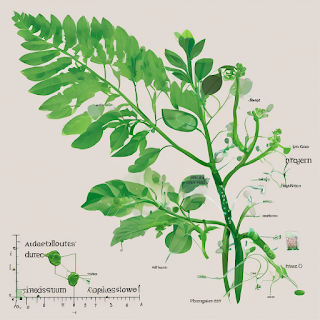As a young farmer passionate about both tradition and innovation, I'm always keeping an eye on emerging areas of plant research that could help smallholders like myself adapt to changing conditions. One field generating huge interest is genomics - the study of an organism's complete set of DNA, or genome. Understanding a plant's genetic blueprint opens up exciting possibilities for sustainable agriculture worldwide.
In this article, I'll share my perspectives on some recent genomic advances after attending several conferences and reading widely on the topic. While acknowledging challenges ahead, I believe genomics holds promise to revolutionize global food security if guided responsibly with farmer priorities in mind. My hope is open discourse helps maximize benefits of this powerful knowledge for small-scale agriculture.
Unlocking Genetic Secrets
Perhaps genomics' biggest breakthrough was sequencing the first plant genome - rice - in 2002. Since then, over 100 crop species' full DNA code has been deciphered, including staples like wheat, maize, soybean and potato. This flood of 'big data' revealed each plant's genetic architecture at an unprecedented scale.
We now understand in fine detail how genes interact to control traits from yield to stress tolerance. For example, the drought resistance gene DREB1 has been identified across several cereals and legumes, opening up new avenues for precise breeding. Genomic insights are also transforming plant pathology, shedding light on disease development at the molecular level.
This genetic understanding enables targeted approaches like marker-assisted selection and genome editing to efficiently introgress valuable traits from wild relatives or engineer novel combinations not present in nature. Such precision breeding holds promise to develop climate-resilient varieties tailored for diverse agro-ecologies worldwide.
Potential Benefits for Smallholders
For resource-poor farmers, genomics offers hope as a sustainable intensification tool. Stress-tolerant varieties bred through genomic approaches may help stabilize incomes against threats exacerbated by climate change with minimal external inputs. This is especially relevant for traditional landraces currently vulnerable to emerging pathogens.
Open-source genomic databases and breeding toolkits could also accelerate variety development and dissemination through participatory models. Regional networks of smallholder cooperatives, plant breeders and researchers could collaborate utilizing shared genomic resources, field phenotyping infrastructure and bioinformatics support.
Such a decentralized model may revolutionize public breeding for marginalized farmers, empowering communities as equal partners in research. With appropriate safeguards and benefit-sharing, genomics could truly serve smallholders rather than undermine their livelihoods or food sovereignty.
Addressing Valid Concerns
Of course, genomics also raises valid concerns around data ownership, benefit-sharing, biosafety and socio-economic impacts that must be addressed proactively. Open yet rigorous oversight is needed to ensure no unintended effects occur from new breeding approaches.
Regulatory frameworks must balance innovation with precaution based on evidence rather than perception alone. Overly restrictive policies risk stifling solutions to sustainability challenges. At the same time, public trust depends on research transparency and fairness.
Intellectual property issues also require resolution to guarantee smallholders access improved varieties on reasonable terms versus corporate control. Open-source, non-commercial models may help maximize genomics' potential while respecting community rights over local resources and traditions.
With inclusive, solutions-focused processes respecting multiple viewpoints, I believe genomics' power as a sustainable tool can be harnessed responsibly for food security worldwide. An open yet rigorous approach is key to building understanding and guiding research accountably.
A Holistic Vision
Of course, genomics alone will not solve agriculture's complex, interconnected challenges. Its applications must be viewed as one part of an integrated strategy combining agroecological practices, policy support, market access and social development.
Variety improvement through any method serves little purpose without accompanying investments in smallholder capacity, infrastructure, risk mitigation and fair trade. A holistic approach addressing root causes of vulnerability empowers farmers as stewards of genetic resources and decision-makers.
Similarly, breeding goals must reflect diverse agro-ecologies and cultural needs versus singular productivity targets. Participatory variety selection ensures locally-adapted, nutrient-dense crops best suited to diverse contexts and diets. Genomics thus complements agroecology when guided through cooperative partnerships.
The Road Ahead
Excitingly, several initiatives are already piloting this holistic, farmer-focused model of participatory genomics for sustainable intensification. Projects in Asia, Africa and Latin America directly involve smallholder communities, public breeders and local universities developing stress-tolerant varieties.
Looking ahead, I'm hopeful continued open yet evidence-based discourse helps maximize genomics' potential benefits for climate resilience while addressing all reasonable oversight concerns. With care, precision and responsibility, this powerful knowledge holds promise to empower vulnerable farmers worldwide as effective stewards of both biodiversity and community well-being.
In closing,
an inclusive process respecting diverse perspectives is key. Sustainability depends on nurturing people and planet through cooperative efforts recognizing our shared stake in a just food system. The journey ahead is an exciting one if we walk it together in trust and care for one another.

Post a Comment